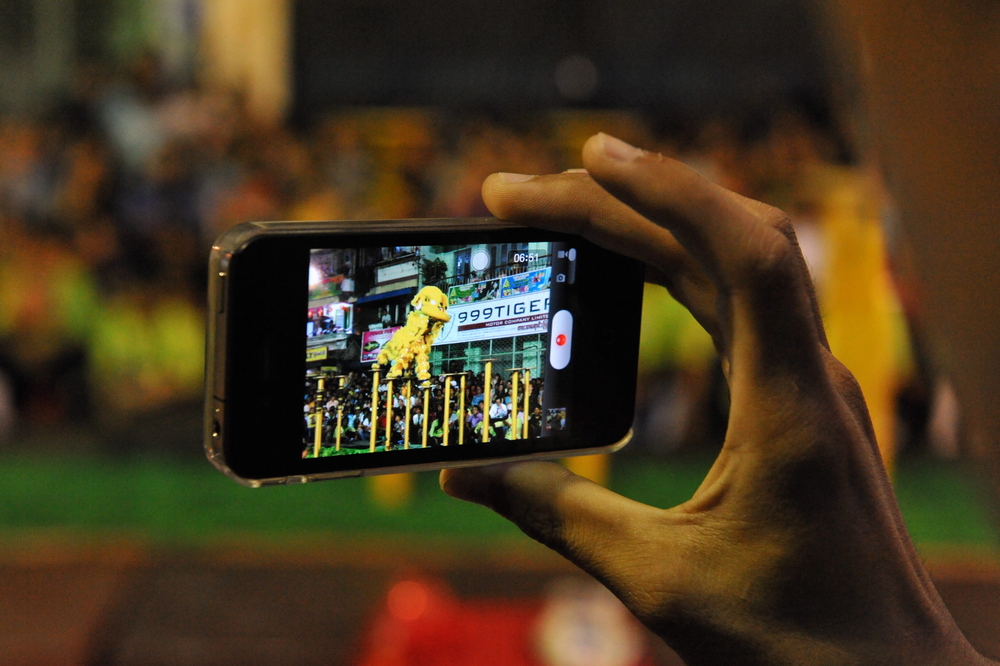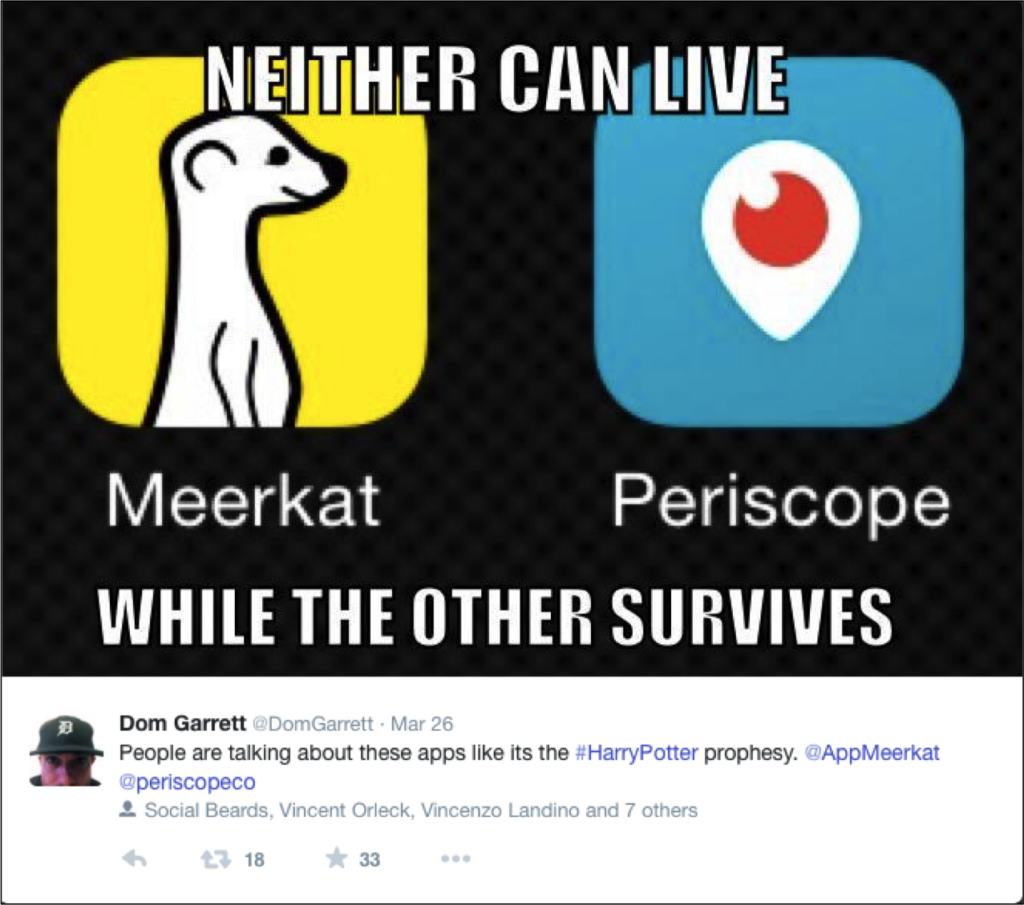
Live streaming video services have finally hit the mainstream market, and are beginning to pick up steam. Many might compare their use to Dave Egger’s 2013 novel, “The Circle,” which explores the beginning of a transparent society in which politicians, public servants, and private citizens “go transparent” by wearing body cams and live streaming every moment of their waking life. In the book, this technology is offered by a popular social media platform, and is adopted at an exponential rate.
Egger’s vision of a “live streaming” society is now coming to fruition. Live video streaming services like Meerkat and Periscope allow users to stream and share videos in real time. The overall market for digital video has also experienced explosive growth in the United States, with over 200 million Americans (just under two thirds of the population) watching videos online on a regular basis.
When it comes to the battle of Meerkat vs. Periscope, who reigns supreme and what do marketers need to know?
What Is Live Video Streaming?
Live video streaming services like Meerkat and Periscope allow users to post and stream live video content on social media. Live streaming has been used by journalists for years, but 2015 is the first year that this kind of technology has gained mass popularity with the public, thanks in large part to the ubiquity of cell phones and social media.
Meerkat vs. Periscope: Turf Wars Begin
Meerkat made a big splash when they launched their live video streaming service in February, 2015, two weeks before South by Southwest (SXSW). Early adopters loved Meerkat because of how well it integrated with Twitter. However, during SXSW, Twitter announced that they would remove Meerkat’s access to their social graph in favor of the live video streaming service Periscope that they quietly acquired in January, 2015.
Twitter’s decision to throw their weight behind Periscope has sparked intense online debates about which platform is better, and which will ultimately survive. Because Meerkat and Periscope are so similar both in terms of functionality and target audience, many people are convinced that one of the two platforms will inevitably fall out of favor.

Which Platform Do Users Prefer?
As the Meerkat vs. Periscope debates continue, sophisticated marketers should know a bit about each platform and the comparative value of each. Although these live video streaming services are similar, there are some key distinctions that might help you decide which app to try first.
Key Features of Meerkat
- Meerkat has a chat functionality that’s useful for sharing links and comments with your followers. However, be aware that anything posted during a live stream will be automatically posted to your Twitter profile.
- Meerkat shows the avatars of people who are watching your video at the top of the video screen. This makes it easy to find and connect with relevant viewers.
- Meerkat videos are gone as soon as the live stream ends. This means that videos can’t be saved or re-purposed.
- Many users prefer Meerkat’s commenting functionality, because it’s easier to find comments after they’re posted.
- Meerkat early adopters were impressed by how well this platform integrated with Twitter. For instance, Meerkat users on Twitter could see which of the people they were following were Meerkat users. Meerkat users also received a notification every time someone they followed on Twitter was streaming, or scheduled a live video stream. Unfortunately, these features are being phased out since Meerkat lost access to Twitter’s social graph.
Key Features of Periscope
- Marketers will appreciate the fact that Periscope shows you performance stats on retention, number of viewers, and average viewing time after your live video stream ends.
- It’s difficult to find comments after they’re posted, because older comments disappear as newer comments are posted.
- Meerkat was developed in a mere eight weeks, while Periscope was developed over the course of a year. The care taken in creation shows in Periscope’s aesthetically pleasing interface, and high quality video. Most users concede that Periscope offers the superior visual experience.
- Both live video streaming services allow viewers to interact with you as you stream. The difference between the two services is that Periscope makes you open a text box to see who’s watching. Unfortunately, the text box partially obscures the video.
- Periscope videos can be saved after the live stream ends. Having the ability to save live video streams makes it possible to re-purpose and re-share content, which is one area where Periscope shines.
- As a native Twitter application, Periscope now has the advantage of being fully integrated with Twitter. It’s easy to follow people form Periscope, and you can choose whether or not to share your live streams on Twitter.
- User’s report that they like Periscope’s blocking feature, which is something Meerkat lacks.
5 Ways Marketers Can Use Live Streaming Apps
Live video streaming services like Periscope and Meerkat bring video to the masses. While consumers have been using Meerkat and Periscope to show the world what’s inside their fridge, marketers may find some more compelling uses.
#1 Event Marketing: Marketers can now easily stream live at company or industry events. For example, you can provide a behind the scenes sneak peek, share the announcement of a game changing product/service or quickly interview influencers on the fly. Make sure that you use the event hashtag in your stream title to increase your visibility on Twitter.
#2 Supplement Customer Research: Understanding how your customers are utilizing live video streaming both personally and professionally can be used to augment your existing customer research process. Remember to follow them on Twitter so you can be notified when they publish an upcoming stream.
#3 Newsjacking: Use live streaming as an opportunity to provide commentary on important news stories for your industry and customers. You may decide just to cover the relevant points, or add your own flavor with team commentary.
#4 Product Demos: Have a great new product and don’t think a Press Release will do it justice? Consider creating a “pop-up” product demo to share with your customers.
#5 Company Announcements: If someone in your organization has recently received a big promotion or you team has reached a big milestone, consider live streaming a candid video about your announcement. This provides a great opportunity to showcase your team and open the door for people to better connect with your brand.
Which platform do you prefer, and do you plan on using it for marketing purposes? Weigh into the debate by leaving a comment below!
Top Photo: Shutterstock


